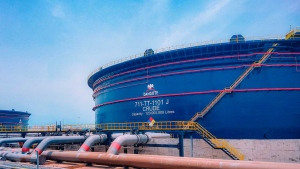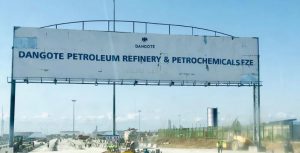 The Dangote Refinery, located in Lagos, Nigeria, was inaugurated recently in a ceremony that attracted five African heads of state, including President Mohammadu Buhari of Nigeria, Paul Kigami of Rwanda, Nana Akufo-Addo of Ghana, Faure Gnassingbé of Togo, Mahamat Déby of Chad, Macky Sall of Senegal, and Mohamed Bazoum of Niger. Despite the fact that Nigeria is a significant oil-producing country in the globe, its residents have faced numerous challenges in obtaining petroleum products on which they rely heavily. Many people are hoping that the Dangote Refinery will help make crucial petroleum products available to the people of West Africa and its neighbours. Aliko Dangote’s new refinery can meet 100% of Nigeria’s refined product needs (Gasoline, 53 million litres per day; Diesel, 34 million litres per day; Kerosene, 10 million litres per day; and Aviation Jet, 2 million litres per day) while also having a surplus of each product for export.
The Dangote Refinery, located in Lagos, Nigeria, was inaugurated recently in a ceremony that attracted five African heads of state, including President Mohammadu Buhari of Nigeria, Paul Kigami of Rwanda, Nana Akufo-Addo of Ghana, Faure Gnassingbé of Togo, Mahamat Déby of Chad, Macky Sall of Senegal, and Mohamed Bazoum of Niger. Despite the fact that Nigeria is a significant oil-producing country in the globe, its residents have faced numerous challenges in obtaining petroleum products on which they rely heavily. Many people are hoping that the Dangote Refinery will help make crucial petroleum products available to the people of West Africa and its neighbours. Aliko Dangote’s new refinery can meet 100% of Nigeria’s refined product needs (Gasoline, 53 million litres per day; Diesel, 34 million litres per day; Kerosene, 10 million litres per day; and Aviation Jet, 2 million litres per day) while also having a surplus of each product for export.
Its importance to the Nigerian economy can be comprehended in numerous ways:
• Reducing Dependence on Imported Petroleum Products: Despite its oil production, Nigeria has historically relied largely on imported petroleum products to meet domestic demand. By developing domestic refining capacity, the Dangote Refinery hopes to dramatically reduce this reliance. This can reduce import bills, conserve foreign exchange reserves, and improve the country’s energy security.
• Energy Self-Sufficiency: The Dangote Refinery’s increased refining capacity will help Nigeria become more self-sufficient in meeting its domestic energy needs by reducing the reliance on imported petroleum products. Since the three major refineries in the country are grounded, it is expected that the Dangote refinery will provide much-needed succor to the populace.
• Foreign Exchange Savings: With reduced imports of refined petroleum products, Nigeria can save substantial foreign exchange that would have otherwise been spent on imports, improving the country’s balance of trade and conserving valuable foreign currency reserves. One of the key points experts are looking out for is how the operations of the new refinery will help boost the foreign exchange
• Job Creation: The construction and operation of the Dangote Refinery have generated numerous job opportunities, both directly and indirectly, providing employment to a significant number of Nigerians and contributing to reducing unemployment rates.
• Skill Development: The project offers opportunities for skills development and knowledge transfer, as workers are trained in various technical and operational aspects of refinery operations, which can enhance Nigeria’s human capital and technical expertise.
• Industrial Development: The Dangote Refinery’s presence contributes to the development of Nigeria’s downstream oil and gas sector and associated industries, creating a conducive environment for the growth of ancillary industries and supporting the country’s overall industrialization efforts.
• Value Addition: The refinery adds value to Nigeria’s crude oil resources by converting them into higher-value refined petroleum products, thereby capturing a larger portion of the value chain within the country and increasing the overall economic benefit derived from oil production.
• Export Potential: The Dangote Refinery has the potential to become an important exporter of refined petroleum products, contributing to Nigeria’s export earnings and reducing the country’s dependence on crude oil exports alone. This will have a positive ripple effect on the Gross Domestic Product of the nation.
• Infrastructure Development: The construction and operation of the refinery require significant infrastructure development, such as transportation networks, storage facilities, and utilities. This infrastructure development can benefit other sectors and regions, promoting economic growth and regional integration. The development will increase the living standard of several household thereby taking them out of poverty.
• Revenue Generation: The Dangote Refinery’s operations can contribute to government revenue through taxes, royalties, and other levies, providing additional funds for public investment in infrastructure, social services, and other developmental projects.
• Economic Diversification: The refinery supports Nigeria’s efforts to diversify its economy beyond oil dependence. By developing downstream industries and expanding value-added activities, the Dangote Refinery helps to create a more resilient and diversified economy.
These are some of the key relevance of the Dangote Refinery to the Nigerian economy. It is important to note that the actual impact will depend on successful operations, effective management, and favorable market conditions. It’s important to note that the actual impact of the Dangote Refinery on the Nigerian economy will depend on various factors, including its successful completion, efficient operations, and the broader policy and regulatory environment. Nonetheless, it is anticipated that the refinery will play a significant role in transforming Nigeria’s oil and gas sector and contributing to the country’s economic development.



